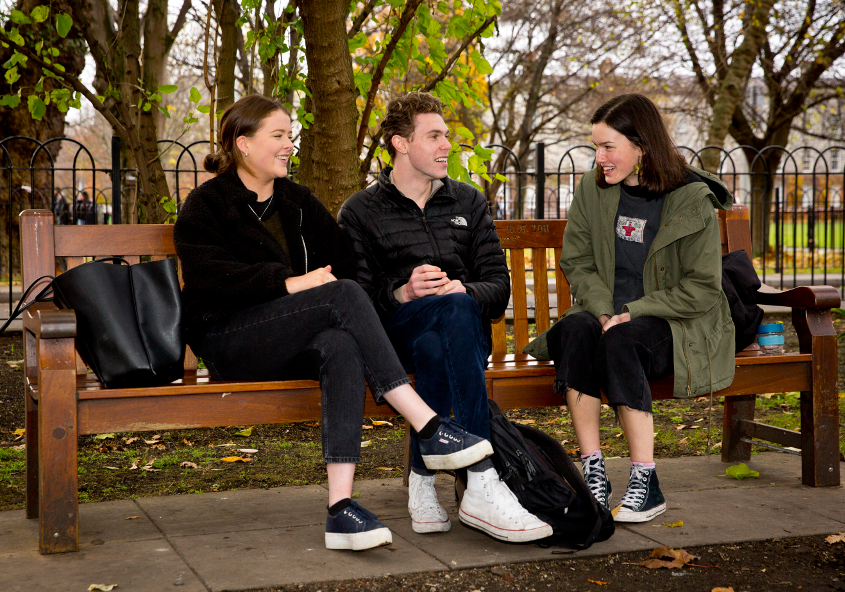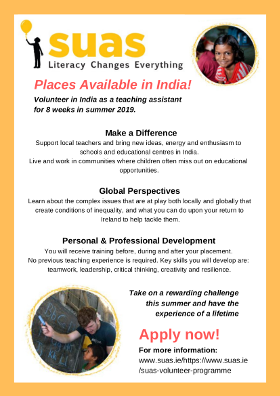Student Volunteering Guidelines
Ethical Volunteering
One of Trinity's Graduate Attributes is To Act Responsibly. Trinity's volunteer rights, responsibilities and standards are set out in the Trinity Volunteer Charter.
Trinity College Dublin is committed to promoting, encouraging and incentivizing greater local, national and international civic engagement by members of the College community.
We value
responsible, collaborative and sustainable engagements
in international development which
respect host cultures and communities, and respond to local needs.
and also,
meaningful international development volunteering
and service-learning placements present significant educational experiences.
This encourages adaptability, ethical responsibility and global awareness among participants. There is more information about ethical volunteering on the Comhlamh website.
Volunteer Opportunities
Other Opportunities


International Volunteering
Before deciding to volunteer abroad, you should think about the following:
- Personal motivation, skills and interests
- Personal resilience, physical and mental health
- Whether the engagement empowers or encourages dependency in the community it is intended to serve
- Whether a volunteering organisation is not-for-profit
- How a volunteering organisation addresses the issues articulated in the
- The economic, social and environmental costs involved as compared with anticipated benefit for all stakeholders. Consider also what fees cover and personal capacity and support available for fundraising.
Comhlámh have drawn up a Volunteer Charter which serves as a good practice guide for people going to volunteer in developing countries. It sets out seven principles that aim to encourage responsible, responsive international volunteering. Comhlámh also offer information sessions and personalised guidance for potential volunteers as well as debriefing and networking opportunities to returned volunteers.
Useful Documents
Garda Vetting (PDF 400KB)
Getting Started with Volunteering (PDF 1.16MB)
International Volunteering (PDF 192KB)
Advice and Visas
Department of Foreign Affairs travel advice should be considered before committing to a placement.
It is not recommended to travel to any region where the level of warning exceeds "exercise caution."
It is the responsibility of the individual travelling to ensure he/she obtains the correct visa to enter their intended destination.
Insurance
Appropriate travel, medical, and personal liability insurance should be obtained. Read the terms and conditions of any policy to ensure that the planned destination and activities, and possible health risks and needs are covered. If an individual chooses of their own volition to travel to an area of political unrest, they should take care that there are no insurance restrictions on related situations which might arise e.g. acts of war, terrorism or kidnap and ransom.
Health
International development experiences can be both physically and psychologically demanding. Becoming ill while abroad can be particularly distressing for the individual, for his/her family, for others involved in the volunteer programme and for the host community. Before travelling, individuals should:
- Ensure he/she is physically and emotionally fit to participate.
- Obtain appropriate vaccinations
- Take medical advice on the need for anti-malarial medication
- Determine what health services are available in/near the host community
- Be mindful of risks associated with drug and alcohol use, sexual health, road traffic accidents etc.
Coming Home
Many people experience reverse culture shock and encounter difficulty settling back in to day-to-day life after a placement. Comhlámh has workshops and resources for returned development workers, volunteers and service-learners to support this transition. In some cases, it may be helpful to avail of counselling services in order to process either the transition home or elements of the experience abroad which may have been particularly challenging or traumatic. If your organisation does not offer a debriefing or you would still like to work more on the returning process, you could participate in one of Comhlámhs "Coming Home Weekends".
It is also important to remember that the placement is not something to be consumed by the individual participant-global citizenship does not end on the completion of a placement abroad. Not everyone is in a position to avail of such opportunities and it is worth considering how you might share your insights with your peers and perhaps a wider audience. Ongoing involvement with the organisation or issue with which you undertook your placement can occur at home through fundraising, advocacy, promotion and continued volunteering.
Local Volunteering
Trinity Organisations
Trinity Volunteering
Central Societies Committee
Dublin University Central Athletics Club (DUCAC)
Local and National Organisations
Localise - Youth Volunteering
Simon
Volunteer Fair
Useful Links
http://www.studentvolunteer.ie
https://www.dcya.gov.ie/cat/EN/Children-First/33.htm
http://www.irishstatutebook.ie/eli/2012/act/47/enacted/en/html


